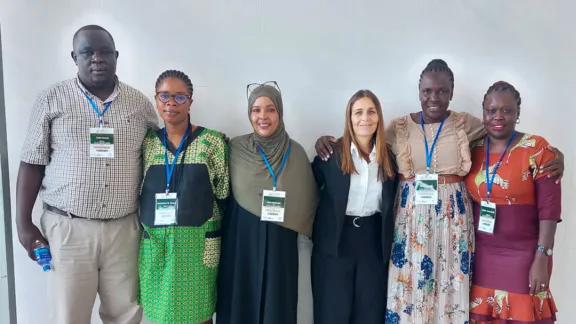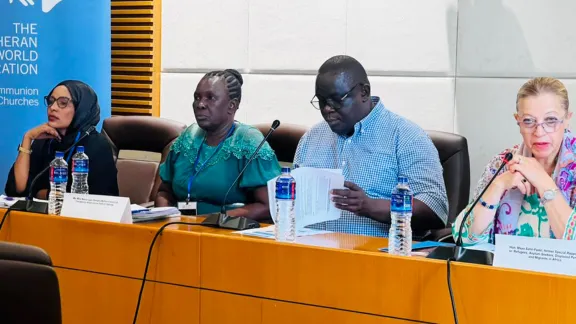
Panelists of the event: ACHPR Commissioner Salma Sassi, Vice-Chair of the Working Group on Economic, Social, and Cultural Rights and Special Rapporteur on Refugee Rights; Hon. Prof. Maya Sahli-Fadel, former Special Rapporteur on Refugees, Asylum Seekers, Displaced Persons, and Migrants; Ms. Milly Nancy Lagu, Chairperson of the Refugee Welfare Council III in Uganda's Kiryandongo District; and Ms. Anab Gedi Mohamed, a refugee leader from Kenya’s Dadaab camp. Photo: Jamestina Quee/ Evangelical Lutheran Church in Sierra Leone
LWF hosts side event with refugee leaders
(LWI) - Food ration cuts, early forced marriage and gender-based violence severely impact the lives of refugee children in Uganda and Kenya. At a side event hosted by The Lutheran World Federation (LWF) during the African Commission on Human and People’s Rights (ACHPR), refugee leaders highlighted the effects of gender-based violence (GBV) on children in displacement contexts. Their testimonies were included in a report on refugee rights across Africa and led Commissioner Salma Sassi to raise these issues with government representatives in Kenya and Uganda.
Voices in darkness
The event took place on 18 October 2024, alongside the 81st Ordinary Session of the ACHPR in Banjul, The Gambia. Titled “Voices in Darkness: A Conversation on the Effects of Gender-Based Violence on the Right to Education in Displacement Contexts, with Examples from East and the Horn of Africa,” a panel of distinguished speakers included expertise on an all-African level as well as representatives of refugee communities LWF works with in Kenya and Uganda.

Ms. Anab Gedi Mohamed, a refugee leader from Kenya’s Dadaab cam, highlighted the situation of refugee girls who are married early. Photo: Jamestina Quee/ Evangelical Lutheran Church in Sierra Leone
Too often, the voices of rights holders are missing from such discussions, and we are proud to have supported the participation of our local partners.
Ester WOLF, LWF Senior Advocacy Officer
The attendance of two refugee representatives was especially difficult to facilitate. As they do not have passports, many can only travel on the Conventional Travel Document, which is unknown by airline staff and immigration authorities. Refugees therefore face harassment and are even refused boarding when trying to attend international events in other countries. Enabling their voices to be heard on this international stage was a significant achievement, says Ester Wolf, LWFSenior Advocacy Officer for Human Rights: "Too often, the voices of rights holders are missing from such discussions, and we are proud to have supported the participation of our local partners."
Making voices heard
The discussion centered on GBV-impact on the right to education in displacement contexts. It examined ACHPR’s role in urging States to uphold displaced persons’ rights to quality education. Salma Sassi, Vice-Chair of the Working Group on Economic, Social, and Cultural Rights and Special Rapporteur on Refugee Rights highlighted that while most African States have ratified crucial agreements such as the African Charter on Human and People’s Rights, the African Charter on the Rights and Welfare of the Child, the 1951 Refugee Convention, and the African Convention on Refugee Protection, implementing these frameworks remains a significant challenge.
“It is common in my settlement that a girl child, who has given birth and returns to school afterwards, faces discrimination. Other children call them names which affects their mental health and education,” shared Milly Nancy Lagu, chairperson of the Refugee Welfare Council in Kiryandongo District, Uganda.
Though the ACHPR continues to push for these rights, ensuring that vulnerable children- including refugee, migrant, and internally displaced children - receive adequate educational support remains a critical, ongoing effort, noted Collins Omondi Omundu, Advocacy Officer at LWF Kenya-Somalia and moderator of the event: "The event was very much welcomed by the refugee communities in our project areas, who followed the live stream.”
Connecting local to global
Following the event, LWF supported the refugee leaders in a lobby meeting with Commissioner Sassi, where they shared the challenges facing school-aged refugees in Uganda and Kenya. Topics included early and forced marriages, and food ration cuts in Uganda by the World Food Programme, which have increased dropout rates among refugee children.
The Commissioner committed to raising these issues with government representatives from Uganda and Kenya. Additionally, at a panel marking the 50th anniversary of the OAU Convention on Refugee Problems in Africa, she presented LWF video recordings featuring testimonies from the refugee leaders about the causes of school dropout and their recommendations for change. Stakeholders discussed these concerns, and Commissioner Sassi assured them that these points would be included in her official report to States on the rights of refugees, asylum seekers, IDPs, and migrants in Africa.
“These commitments underscore the importance of our advocacy for refugees’ rights and show the power of connecting local challenges to global platforms,” concluded Jacky Ruth Akello, LWF’s Technical Lead for Advocacy in Africa.


